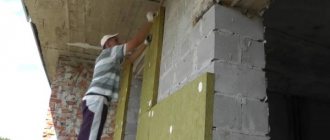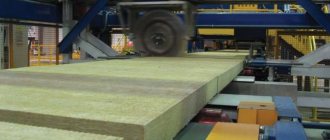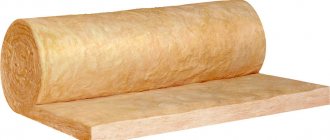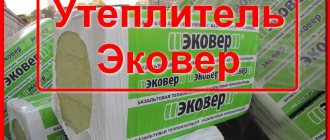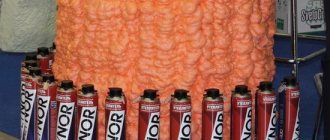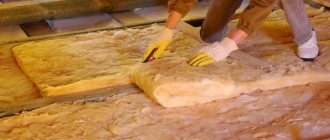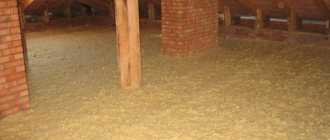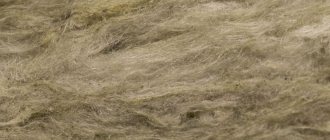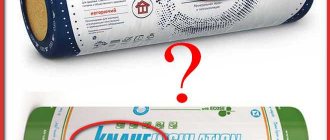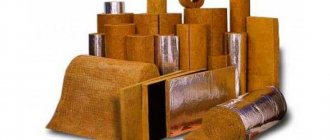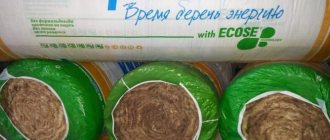Soundproofing materials Ecover
The clicking of heels in the hallway, the neighbor's TV on the side, someone started cleaning with a turbo vacuum cleaner - for most of us, these sounds will immediately evoke negative memories, because they are the ones we least want to hear when we come home. Unfortunately, only the lucky few manage to avoid this.
We are less concerned about the noise level in offices, but this is due solely to ignorance of what it should ideally be. Humming air conditioners, emotional colleagues behind one partition, a slamming microwave lid in a corporate kitchen behind another - a responsible European employer would have long ago spared its employees from this, taking care of their performance.
Based on the nature of propagation, noise is divided into two types - airborne and shock (understanding this is important for choosing means to combat them). The former are transmitted due to air vibrations
This is music, the hum of a vacuum cleaner, a phone call, a car alarm siren, barking dogs, etc. The structure of the building takes part in the movement of the latter. We can talk about drilling, objects falling on the floor, water running through pipes, etc.
Why do we even hear all this clearly while in our apartments and offices? The sound-absorbing ability of building materials depends on what structure they have: the more open pores there are and the higher the elasticity, the better the protection. The fact is that common building materials do not always meet these requirements and there is simply no talk of any sound absorption on their part. For example, the sound absorption coefficient of concrete is only 0.05, wood - 0.1, pile carpets, in the soundproofing function of which everyone who hung them on the walls believed - 0.2. Achieving acoustic comfort is almost impossible due to structural, finishing and decorative elements. The only way to achieve this is to use highly porous mineral wool boards, which include products from the EKOVER plant.
The secret of the properties of soundproofing materials lies in the production process: the raw materials are melted at a temperature of one and a half thousand degrees and separated in a centrifuge into the smallest fibers, which are then impregnated with a binder and put on the line to form the so-called carpet. Up to 95% of the volume of this carpet is occupied by pores filled with air. The highly porous structure gives basalt wool a sound absorption coefficient of 0.95, which is 19 times higher than concrete. Passing through basalt fibers and cavities, sound waves lose energy, turning into heat (for humans, this process is certainly not perceptible, but physically it looks like this). As numerous tests have shown, mineral wool insulation reduces the level of impact noise by 36 dB, airborne noise by 58 dB. If you translate the numbers into understandable language, then you will not hear your neighbors stomping and talking loudly. And, for example, the cry of a child or the barking of a dog will be perceived by you approximately as a muffled conversation.
How is mineral wool used? If the task is to protect the room from airborne noise, then the walls, interior partitions, ceilings and floors are sheathed. ECOVER ACOUSTIC slabs are suitable for this task. In accordance with the regulatory framework (GOST 23499-79), they belong to the group of materials with high sound-absorbing properties and can be used in any enclosing structures of residential buildings. For sound insulation from impact noise, the line includes separate products - ECOVER STEP, ECOVER STEP OPTIMA and ECOVER STEP PLUS, which are used in “warm” and “floating” floors under screed.
Specialized acoustic insulation can also be used in specific areas: to dampen sounds emitted by various industrial facilities, during the construction of facilities with special requirements for acoustics (theaters, cinema halls), in protective screens enclosing residential buildings located near major highways and interchanges and etc.
General building insulation
The main purpose of these products is heat and sound insulation inside buildings and structures. Depending on the density of basalt slabs and the additives used, it is divided into several groups.
Light Universal
Designed to create an effective internal thermal insulation layer in unloaded structures of any type. These include building walls, attic spaces (suitable as insulation for attic roofs), and soundproofing partitions. For ventilated facades it can be used as an inner layer.
Light
For this group, you can select slabs depending on the density of the material. Their purpose completely coincides with the “Light Universal” described above. However, the expanded range makes it possible to choose the optimal model of basalt slab for internal insulation.
Light Universal
Light
Standard
This is a truly universal insulation material that can be used to create a reliable thermal barrier inside buildings. The increased density (60 kg/m³) is the main factor in the improved thermal insulation properties of this type of basalt wool.
Acoustic
To create good sound insulation, the manufacturer recommends installing a special type of basalt wool Acoustic. It is mounted in interfloor partitions, ceilings and floors, in which logs are provided. It is noteworthy that depending on the required level of noise reduction, you can select slabs of appropriate thickness - from 40 to 250 mm. A special series of basalt slabs was developed for external thermal insulation.
Wall insulation options
The only correct option for effective and durable thermal insulation of walls is external thermal insulation. It fully complies with the principle of proper insulation from the point of view of thermal physical processes.
The essence of proper insulation is that the vapor permeability of all wall construction materials in the direction from the room to the street should increase. When insulating from the inside, this proportion is violated, which leads to numerous undesirable effects and significantly reduces the efficiency of using insulation. Therefore, insulating walls from the inside is justified only when, for some reason, external thermal insulation is impossible. And only when using a special additional vapor barrier on the side of the room.
In addition, external thermal insulation avoids the formation of condensation on the walls, which prevents the formation of dampness, which contributes to the spread of microorganisms and the formation of mold. Insulation also helps to neutralize the undesirable effects of strong temperature changes, when the wall “heats” under the scorching sun during the day and cools down greatly on a cool night.
Features of the production of basalt mineral wool
The composition of the raw materials, as well as the production technology of Ecover mineral wool insulation, determine their performance properties. The starting material is gabbro rock. Sometimes during mining it is deoxidized using limestone or dolomite. Before becoming high-quality thermal insulation, this composition goes through the following production stages:
- Melting of raw materials in a special unit at a temperature of 1,500°C.
- Formation of fibers in a centrifuge.
- The entry of raw materials into the chamber where fiber deposition occurs.
- Impregnation of fibers with hydrophobic and modifying compounds to improve the performance properties of the finished material.
- Formation of a mineral wool carpet with uniform density.
- Compressing the carpet under a special corrugated press.
- Polymerization under high temperatures.
- Sawing mineral wool carpet into slabs of specified sizes.
- Sealed packaging of the finished material.
Please note: the Ecover company produces basalt insulation only in slabs
Choice of insulation
Let's try to compare two types of insulation based on basalt fibers and understand which isover or ecoover is better. Both materials are derivatives of stone wool. Only isover is produced by the international corporation Saint-Gobain, while ecoover is produced by a Russian enterprise and this material is much cheaper than imported ones. Their properties and physical and technical indicators are largely similar. The scope is also the same.
Both thermal insulation materials are capable of creating a favorable microclimate in the insulated rooms and have significant elasticity. However, isover is able to withstand greater mechanical loads in comparison with ecoover.
Another difference is that ecoover is only available in slabs of a certain size. Whereas the manufacturer offers isover in the form of slabs, mats and rolls. This means that you can choose the option that is most convenient for installation.
In addition to the positive aspects, both insulation materials have a small but significant drawback. Rock wool is attacked by rodents. Therefore, for buildings in which their presence is expected, it is better to choose insulation based on glass wool.
Wall kit
Isover or Rockwool which is better?
Mineral wool remains the most common and sought-after material for country houses. Thermal insulation based on it is produced by different manufacturers, so it can be difficult to decide on a specific choice. Which is better - Isover or Rockwool? Both of these foreign brands have received wide recognition; they are actively used in suburban construction. How do these materials differ, and what is the best choice?
Advantages and features of Isover
Isover mineral wool is produced by the Saint-Gobain concern with a long history. This brand produces insulation based on fiberglass and stone wool. The products can be used for pitched roofs, insulation of walls from the outside and inside, frame walls, partitions, and ceilings. The range also includes special insulation for saunas.
The products of this manufacturer have become widespread due to several advantages:
- High environmental friendliness and fire safety. The manufacturer carefully controls the quality of raw materials to ensure compliance with standards.
- Good vapor permeability. Thanks to this, the insulation can be used for the inner surface of walls and for partitions - it does not create a “thermos effect”.
- Convenient installation that does not require special protective equipment.
Isover mineral wool is a universal practical solution for insulating various structures. This brand has passed multiple quality tests and has gained a good reputation in the market.
Features of Rockwool products
The ROCKWOOL brand has become one of the most famous on the market. The manufacturer specializes in only one type of insulation - basalt wool. This brand produces stone wool slabs with the following advantages:
- Environmental Safety. The manufacturer refused to use formaldehyde as a binder, so the thermal insulation material of this brand is suitable for indoor use.
- Good sound insulation properties. Basalt fiber has numerous air layers that prevent sound propagation.
- Elastic structure of the plates, resistant to deformation. This ensures their durability - the material retains good insulation properties for many years.
- Effective thermal insulation, absence of cold bridges between the plates.
Rockwool brand products have become synonymous with quality thanks to strict control of raw materials, high efficiency and the manufacturer's increased attention to environmental friendliness. Stone wool under this brand has been produced for over 80 years and has acquired an excellent reputation in the insulation materials market.
What is better to choose for your home?
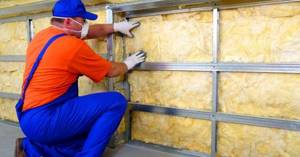
There is no single answer to the question: which material is better. The products of both brands are of guaranteed quality and effectively cope with their task, protecting the house from the cold. However, fiberglass-based insulation is much cheaper than stone wool, so Isover products are more economical.
Fiberglass has a lower density, which somewhat limits the possibilities of its use. Both types of materials require high-quality water and vapor barriers to prevent fiber destruction.
Rockwool mineral wool is more resistant to heat - it can withstand temperatures up to 700 degrees. However, this advantage can only be important during a very severe fire; if fire safety regulations are observed, fire resistance does not matter.
Thus, both materials have important advantages, and products from both brands will be a good option for insulating a home. When choosing, you should focus on the characteristics of a specific task and financial capabilities.
Similar articles
House insulation with Ecover
Insulation materials Ecover - general construction thermal insulation used for roofs, ventilated and plaster facades, ceilings, partitions, attic floors. The entire line of insulation materials is based on mineral wool - the material has low thermal conductivity and excellent sound insulating qualities. The manufacturer produces a wide range of materials for frame, concrete and other buildings.
How to insulate a house made of timber with TIZOL?
TIZOL is a Russian fireproof material based on basalt wool. Although the name stands for “technical insulation”, it is suitable for insulating building structures in wooden country houses. Effective insulation reduces the heat loss of the building and does not interfere with its environmental friendliness.
Peculiarities
Ecover basalt insulation is produced on the most modern equipment using advanced technologies, thanks to which the products fully comply with international standards. Each stage of production is subject to strict control in order to strictly adhere to technology. It is worth noting that the high technical characteristics of this material make it an excellent alternative to imported thermal insulation.
Ecover mineral slabs are based on special rock fibers that are fixed to each other using synthetic phenol-formaldehyde resin.
This feature facilitates the use of such building material not only outside, but also indoors, regardless of their purpose.
Mineral insulation "Ecover" is one of the leaders among thermal insulation materials presented on the world market. Thanks to its incomparable technical characteristics, it occupies a high position in the popularity rating among similar products. A healthy structure is one of the most important priorities of this material, so the demand for it is increasing every year.
The advantages of these products include several characteristics.
- Excellent thermal insulation. Mineral wool perfectly retains heat indoors, significantly reducing the level of heat loss.
- Good sound insulation. The fibrous structure and density of the slabs create an increased level of sound insulation, creating the most comfortable conditions for your stay.
- Increased fire resistance. Insulation belongs to the group of non-combustible materials, as it is resistant to fire.
- Environmental Safety. The use of basalt rocks, as well as a powerful cleaning system, contributes to the production of mineral wool that is absolutely safe for health.
- Resistant to deformation and sudden temperature changes. Even during the compression process, the products perfectly retain their original qualities and are able to withstand maximum loads.
- Good vapor permeability. The slabs do not accumulate moisture at all, allowing it to fully penetrate through the structure.
- Ease of installation. The material can be easily cut and laid, making the installation process quick and convenient.
- Affordable price. The entire range is characterized by an affordable price, due to which the products are widely used in the construction industry.
Its pristine qualities are perfectly preserved during the entire period of operation, which creates the most favorable conditions both inside and outside the room, regardless of its intended purpose.
Izover insulation
The production of Izover insulation is carried out using TEL technology from high-quality fiberglass. The product obtained in this way has the following characteristics:
- Thermal conductivity is about 0.041 V/m K - an indicator that provides excellent thermal insulation. Over time, this figure does not increase, keeping the room temperature constant over a long period.
- High-level sound insulation thanks to small air gaps between the fibers will not only provide protection from noise on the street, but also isolate the rooms inside the building from each other.
- Fire safety. All Izover mineral wool is not susceptible to fire and meets fire safety requirements. Therefore, its installation can be carried out in buildings of any type.
- Vapor permeability is 0.5 mg/mhPa - an excellent indicator for this type of insulation material, however, with an increase in humidity by 1%, thermal insulation decreases by 10%. In order to prevent the mineral wool from getting wet, you should leave a gap between the insulation and the wall for better air ventilation.
- Life time. The manufacturer claims a lifespan of 50 years without deterioration in quality; this information is confirmed by reviews from owners who have been using this material for several years.
- Health safety. It is believed that some types of mineral wool negatively affect human health, but scientists have proven that Izover thermal insulation does not harm human health.
- The weight of Izover slabs is quite low, so they are widely used for insulating buildings with weak structures.
- Form of production. Izover mineral wool is produced in rolls of 16-20 cubic meters. meters and slabs, single-layer, 5-10 cm thick and multi-layer, the thickness of each layer is 5 cm. The cutting of slabs can be very diverse.
Hydrophobicity of stone wool
ECOVER stone wool fibers are coated with a water-repellent agent, which repels water at the molecular level by reducing surface wettability. As a result, thermal insulation boards do not absorb moisture. Water that gets on the surface of the slabs does not penetrate deeper, due to which they remain dry and retain their high heat-shielding properties. High hydrophobicity is assessed by the water absorption indicator, which for ECOVER products is less than 1.5% by volume, and for light brands it is less than 2.5%. The ability to absorb moisture from the air is measured by the value of sorption humidity, which is also minimal for ECOVER slabs. The hydrophobicity of ECOVER products ensures their high thermal insulation properties under any operating conditions.
What is better rockwell, isover or ursa
- Which is better: rockwell, isover or ursa?
- How to choose good insulation for walls
- How does mineral wool affect health?
All these materials are high-quality insulation materials that are successfully used at construction sites. The structure of isover, rockwell and ursa is the same: tiny fibers of cotton wool, between which cavities filled with air are formed. It is the most effective heat insulator. This ensures the high thermal insulation properties of each of these materials.
What are the differences
Rockwell is made on the basis of basalt fiber, and Ursa with isover is made on the basis of fiberglass. The differences between these materials are as follows:
— basalt ones have higher thermal insulation properties — the hygroscopicity of materials based on basalt fiber is less than 1%. (in isover and ursa, since their structure contains fiberglass, the hygroscopicity is 10-20% higher than that of rockwell) - basalt fibers are more resistant to alkalis and steam - during installation of isover and ursa, the release of the smallest particles of fiberglass is observed - the thorniness of rockwell much lower than that of materials made from glass fibers—isover and ursa, in the event of a fire, begin to burn out at lower temperatures than rockwell
What properties are similar
Each of these materials provides high-quality sound insulation, which increases the comfort of living in the house. All of them are durable and have high thermal insulation characteristics. Each of the insulation materials is vapor permeable. That is, in the cold season it is able to remove excess steam outside, and in the summer it can prevent overheating of the internal space of the house.
Izover, Ursa and Rockwell are easy to install, but the latter provides greater ease of operation. All insulation materials are capable of maintaining the stability of their size, that is, they have a fairly high coefficient of resistance to mechanical stress. It is recommended to use slabs for vertical insulation, and rolled materials for horizontal insulation.
If you need to protect your home from rodents, it is better to use glass wool, as it is more dangerous for them than basalt fiber. There is a point of view that the advertised benefits of stone wool are just an excellent marketing ploy. By and large, the differences between fiberglass and basalt are minimal.
Therefore, any of these insulation materials will serve flawlessly for a long time.
But to ensure maximum thermal insulation effect, when choosing materials you need to pay attention to the degree of their density. For example, for Ursa it can be as follows: P-15 (13-16 kg/m3), P-30 (26-32 kg/m3), M-11 (1 kg/m3), etc.
Excellent thermal insulation ability of stone wool
EKOVER stone wool slabs have one of the lowest thermal conductivity coefficients among similar materials, which allows you to keep the room warm in winter and cool in summer. This is achieved by the fact that the finest basalt fibers in the structure of the material are closely intertwined and form tiny pores filled with air. As is known, air has the lowest thermal conductivity, and in stone wool slabs it is stationary, which eliminates the transfer of heat by convection.
The thermal conductivity of stone wool slabs depends on the density.
The lowest thermal conductivity coefficient (the best thermal protection indicators) is observed at a density of 50-80 kg/m3. At lower density values, the pores between the fibers become larger, which somewhat increases the mobility of the air contained in them. In high-density boards, the volume fraction of the solid phase—fibers—increases and the fraction of pores decreases, which also slightly increases thermal conductivity.
Saturating any material with moist air increases its thermal conductivity coefficient, since water conducts heat well. When calculating thermal insulation for a specific structure, the calculated thermal conductivity coefficient is used, which takes into account the moistening of the material during operation due to natural air humidity. This figure is slightly higher than the dry value. Such coefficients are determined experimentally and are applied depending on the climatic zone in which the construction site is located.
The minimum thermal conductivity coefficients of ECOVER slabs make it possible to significantly reduce the thickness of the enclosed structure. For comparison, 50 mm of EKOVER stone wool in its thermal insulation capacity replaces more than 180 mm of pine or spruce timber, about 300 mm of aerated concrete, 680 mm of hollow brick or 2500 mm of reinforced concrete.
About basalt wool: what it is, characteristics, etc.
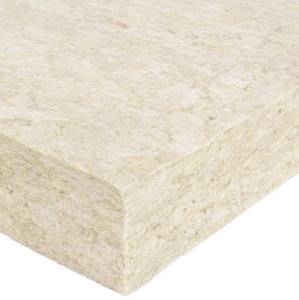
The structure of basalt wool insulation close-up. Photo by Leroy Merlin
Basalt wool is one of three types of mineral insulation. The process of producing thermal insulation material begins with the melting of gabbro-basalt rocks of volcanic origin. The resulting fiber strands are mixed with synthetic resins , polymerized at high temperatures and pressed into single layers that differ in density, rigidity and size. At the end, the canvases take the form of sheets, rolls, cylinders, and shells. The feedstock provides several characteristics :
- non-flammability, ability to withstand temperatures up to 1000 degrees Celsius and exposure to open fire;
- hydrophobicity, i.e. repelling water;
- vapor permeability;
- strength is ensured due to randomly arranged fibers; low thermal conductivity coefficient;
- resistance to chemical and biological influences.
These characteristics are inherent in basalt insulation, but the products of each brand also have their own individual properties. In addition, each company prefers to focus on individual properties and areas of application of products.
Parameters Ecover Standard
| Meaning | Measurement |
| Nominal Density | 45 kg per cubic meter |
| Thermal conductivity | 0.035-0.036 W per mK |
| Amount of organic matter | 3% by weight |
| Moisture absorption | No more than 1 kg per sq.m. |
The presented types are mounted mainly on loggias and joists.
- Series for facades. It includes slabs with increased density and better thermal insulation properties. The line includes:
- Eco-facade - mounted on walls, under a thin layer of plaster. Withstands up to 40 kPa. The degree of thermal conductivity is 0.035-0.041 VK per mK;
- decor - have a thickness from 2 to 20 cm, peel strength exceeds 80 kPa, thermal conductivity - 0.039-0.043 W per mK. The insulation for the facade is packaged in 6 slabs, measuring 100x60x5 cm. Volume - 3.6 square meters.;
- ventilated façade 80, 90 – used both for exterior finishing and for finishing with plaster with reinforced mesh on the surface. Density varies from 70 to 120 kg per cubic meter. The degree of moisture absorption is 0.75 percent. Packaging – 12 slabs measuring 100x60x5 cm and a volume of 0.36 cubic meters.
Indicators of main characteristics
| Meaning | Measurement indicator | Number |
| Heat conductivity at 10/25 degrees | Watts per mK | does not exceed 0.035 – 0.037 |
| Tensile strength | kPa | not less than 40 |
| Number of organic components | % | no more than 4 by weight |
For the roof. This model range includes slabs with a higher degree of rigidity. Scope of application: used roofs. Density degree – 135 – 150 kg per cubic meter. Not recommended for use in attics and basements. The thickness of the material is 5 – 20 cm. Moisture absorption does not exceed 0.75%. The amount of organic substances in the composition is no more than 4.5%. Ecover for roofing is packed in 8 sheets, each of them has dimensions of 100x60x5 cm. Volume - 0.24 cubic meters.
Characteristics table
| Meaning | What is it measured in? | Type | |
| 135 | 150 | ||
| Nominal density indicator | kg per cubic meter | 135 | 150 |
| Heat conductivity rate at 10/25 degrees | Watts per mK | 0,038 – 0,039 | 0,038 – 0,039 |
| Compression | kPa | not less than 45 | not less than 50 |
| Strength under direct load | N | not less than 600 | not less than 650 |
| Tensile strength limit | kPa | about 10 | about 12 |
For the floor. Here Ecover Step is used with a density of 135 kg per cubic meter. and Step + - 150 kg per cubic meter. Scope of application: installation of floors, basement floors and basements. Additionally, underfloor heating, concrete or cement-sand screed can be laid on the insulation. Ability to withstand loads – 30-35 kPa.
Floor insulation Ecover Light
Technical indicators of the material
| Meaning | Measurement | Quantity |
| Thermal conductivity 10 – 25 degrees | Watts per mK | 0,035 – 0,037 |
| Compression ratio | kPa | not less than 35 |
| Moisture absorption | kg per sq.m. | does not exceed 0.75% |
| Presence of organic matter | % | no more than 4 |
Specifications
Mineral insulation is made from basalt raw materials, mined by a manufacturer of thermal insulation materials at the Bazhenov deposit in gabbro rocks. Ecoover is endowed with its characteristics and features by adding water repellents and modified additives to the main raw materials. Its thermal conductivity is not inferior to other popular products on the market among insulating products for construction purposes. 50 mm of insulation has properties equal to almost 200 mm of wood or 300 mm of masonry made of gas or foam concrete.
The characteristics of Ecover basalt fibers give the material a special feature: it is highly resistant to heavy loads.
One square meter of surface can withstand pressure of 8 tons.
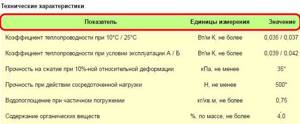
Ecoover mineral wool melts at temperatures above 1000 degrees Celsius, which makes it a practically fire-resistant product. The density of insulation in the product line of this brand reaches 150 kilograms per cubic meter. The ecoover light station wagon has a reduced density, in which it is less than 30 kg per square meter. meter. The compressibility of insulation varies from 5 to 25 percent depending on the type of material. When partially immersed in liquid, thermal insulation is characterized by an absorption rate of no more than one kilogram per square meter. At the same time, it allows water to pass through itself without absorbing it. Depending on the operating conditions, the thermal conductivity coefficient of the insulation changes. On average it is 0.035-0.040 W/m*K. The characteristics allow the insulation to be used as a soundproofing product; among the entire line of products, Ecoover Acoustics is the most suitable for these purposes. It is suitable for use in non-load-bearing structures such as frame house partitions, timber floor frames, etc. Has high vapor permeability. The composition contains no more than 3% organic additives.
Facade insulation
The development of technology and the experience of builders when working on insulating walls of building facades raised the question before developers about the need to create a material suitable for thermal insulation of walls. This is how the basalt insulation of the ecover façade became. Traditionally possessing high resistance to external factors, the new product began to be used for insulating external walls and in ventilated facade systems.
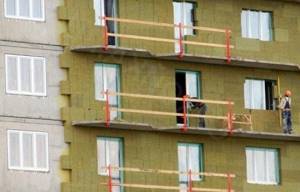
Ecover vent facade 80 is also applicable for single-layer insulation of wall surfaces as the main thermal insulation material. It is also used as a surface layer with an air gap in ventilated systems on top of other heat insulators.
For thermal and sound insulation of wall surfaces in façade systems, eco-facade eco-cover is suitable for plastering with a thin layer. It has greater strength compared to other products. Due to its technical characteristics, eco-facade eco-facade is suitable for use in finishing works on buildings of any number of floors. Ecover vent facade has less water absorption than insulation for interior work.
There are several types of insulation for facade use, among which are the following brands:
- Facade decor;
- Façade decor optima;
- Sandwich;
- Sandwich K.
Brand Facade decor
Ecover façade decor is a rigid thermal insulation composition based on basalt minerals with the addition of hydrophobic and synthetic additives. It is applicable in external facade systems for further plastering of walls using reinforcing mesh.
Product Parameters:
- Density is 150 kg per cubic meter.
- Resistance to compression over 50 kPa.
- Water absorption less than 1.5%.
- At temperatures from -10 to + 25 degrees, thermal conductivity changes from 0.039 to 0.037 W/m*K.
- Included in the class of non-combustible materials.
Brand Facade Decor Optima
Ecover façade decor optima is optimally suited for plastering façade walls in a small layer. According to its data, it fully satisfies all the requirements of the regulations for plastering systems. Mineral boards have high adhesion properties to adhesive compositions suitable for their installation.
The surface of the plaster after application to the insulation does not become stained when it dries.
Options:
- Density 135 kilograms per m3.
- Compression resistance greater than 45 kPa.
- Water absorption 0.75 kg per square meter. meter.
- At temperatures from -10 to + 25 degrees, thermal conductivity changes from 0.037 to 0.035 W/m*K.
- Non-flammable
Brand Sandwich
Ecover sandwich C is a three-layer “pie” consisting of a central thermal insulation layer and two profile sheets on the outer and inner sides. The Ecover brand produces this product to order in thicknesses of 100 and 200 mm. Builders use it to construct the walls of buildings from metal structures. Options:
- Density from 80 to 110 kg per m3.
- Compressive strength varies from 50 to 75 kPa.
- Water absorption 0.75 kg per square meter. meter.
- At temperatures from -10 to + 25 degrees, thermal conductivity changes from 0.042 to 0.039 W/m*K.
- Non-flammable
It also has all the properties necessary for façade thermal insulation.
Brand Sandwich K
As a product for thermal insulation work, Sandwich K differs from the previous one in its greater density and the possibility of use for the installation of warm roofing floors. It has found its wide application in the construction of industrial, shopping and entertainment centers. The use of this insulation significantly reduces the installation time. Product Parameters:
- Density from 120 to 140 kilograms per m3.
- Compressive strength varies from 85 to 110 kPa.
- Water absorption 0.75 kg per m2.
- At temperatures from -10 to + 25 degrees, thermal conductivity changes from 0.044 to 0.041 W/m*K.
- Non-flammable
Teploknauf or Rockwool Comparison of insulation for a country house
Choosing insulation for a private home often turns out to be even more painful. This is due to the fact that all experts have their own opinion regarding insulation. Because of this, choosing between TeploKnauf mineral wool and Rockwool basalt wool can be extremely difficult, and the choice is made mainly in favor of one specific insulation.
In order to put an end to the confrontation between TeploKnauf and Rockwool insulation, we will simply compare their main characteristics and explain the differences, if any. For maximum objectivity, materials were taken from the economical price segment intended for wall insulation: RockWool and TeploKnauf Cottage insulation. Information taken from official sources.
Insulation TeploKnauf
Rockwool insulation
- Doesn't hurt
- Thermal conductivity: 0.037 W/(m K)
- Density 15 kg/m2
- Safe for health
- Not flammable
- Not suitable for direct loads
- Doesn't hurt
- Thermal conductivity: 0.039 W/(m K)
- Density 40 kg/m2
- Safe for health
- Not flammable
- Can withstand direct loads
The main characteristics of basalt and mineral wool are similar, but there are a couple of significant differences that are worth paying attention to when choosing insulation for a country house
Thermal conductivity is the main indicator that you need to pay attention to. The higher this value, the more heat will come out of the house; accordingly, the lower it is, the better.
A difference of a few hundredths is not particularly critical, but it is better to be sure that the insulation you have chosen will accurately cope with its tasks. Manufacturers of insulation materials TeploKnauf and Rockwool consider density as one of the main advantages of their product: some claim that higher density is better, others, on the contrary, deliberately reduce it. In fact, to figure out which is more effective, a comparison of a sheepskin coat and a down jacket is perfect. At -30, a down jacket will be a much better solution. Than a heavy sheepskin coat that freezes quickly. For the myth that high density protects better from the cold, we can thank the manufacturers of this same stone wool, who came up with it. Direct loads mean physical impact on the insulation. TeploKnauf Cottage without auxiliary materials will have a hard time surviving the winter under a flat roof, unlike Rockwool, which, due to its high density, will be easier to withstand pressure. Due to its high density, basalt wool is easier to install than less dense mineral wool.
The main thing for the end consumer will be that the most expensive basalt wool and economical mineral wool will handle the insulation of floors, walls and ceilings in the same way due to their characteristics.
Good roof insulation is valuable not only in winter - it also saves you from the summer heat and cuts out excess noise from outside. The range of insulating materials is large, but choosing the best option is difficult for an inexperienced person. Too many nuances, unconvincing advertising promises and conflicting reviews. Let's figure out what the modern market offers us, and how we can insulate an attic, a regular roof or an attic.

It is more profitable for a private homeowner to choose reliable material that does not require replacement for at least a dozen or two years. After all, doing major repairs yourself will be difficult and expensive. That is why it is worth choosing products from a well-known brand that protects its reputation and does not produce outright defects. But all famous companies that produce insulation materials must have some unique production technology. So you will have to be especially careful when selecting decent thermal insulation for a roof or attic, correlating new products with your own requirements. And we will help you understand the nuances.
Benefits of Ecover
Ecover mineral wool slabs have unique heat-insulating and sound-proofing properties. They are non-flammable, due to their strength parameters they are resistant to deformation and subsidence, are not saturated with moisture (hydrophobic), and are environmentally friendly. All this is confirmed by relevant certificates and test reports at all stages of production. The material has passed the necessary operational tests. This type of stone wool based on basalt-type minerals produced by the modern company Ecover was developed specifically for use in non-load-bearing structures of premises. A large number of standard sizes of sheets of material: from 50 to 200 mm by 600, 1000 mm allows you to organize a waste-free system for insulating buildings. Different thicknesses allow you to optimize and reduce the cost of work.
The low specific gravity and the unique ability to maintain its original shape throughout the entire period of operation leads to an increase in the maintenance-free maintenance period of multi-pitched roofs, attics and ventilated types of facades with a significant glazing area.
Advantages and disadvantages
The insulation is not afraid of ultraviolet radiation, so there is no need to rush when finishing
Thermal insulation Ecover has a number of advantages when comparing this insulation with analogues:
- reduction of thermal losses by 50%;
- the material is not susceptible to bacteria, fungi, mold;
- rodents do not spoil the product;
- UV resistance;
- good sound absorption rates;
- environmentally friendly material;
- has the ability to withstand high temperature influences;
- does not deform under mechanical and static load;
- long service life - more than 50 years;
- good hydrophobicity and vapor permeability;
- easy installation.
Advantages and disadvantages
The insulation is not afraid of ultraviolet radiation, so there is no need to rush when finishing. Thermal insulation Ecover has a number of advantages when we compare this insulation with analogues:
- reduction of thermal losses by 50%;
- the material is not susceptible to bacteria, fungi, mold;
- rodents do not spoil the product;
- UV resistance;
- good sound absorption rates;
- environmentally friendly material;
- has the ability to withstand high temperature influences;
- does not deform under mechanical and static load;
- long service life - more than 50 years;
- good hydrophobicity and vapor permeability;
- easy installation.
Advantages
Looking at the breadth of the Ecover company’s product range, it becomes obvious how wide the scope of application of the manufacturer’s products is. This in turn is due to the positive properties of the thermal insulation material:
- Use in production of exclusively natural, environmentally friendly mineral raw materials.
- Preservation of the shape and technical properties of the material under significant temperature changes.
- Chemical resistance, heat resistance, non-flammability, water-repellent qualities of the thermal insulator.
- Excellent soundproofing properties.
- Resistance to ultraviolet radiation, microorganisms and rodents.
- Long service life.
- Easy installation using simple improvised means.
- Availability and reasonable price.
Main advantages
Ecover Light basalt insulation is distinguished by its high thermal insulation ability and hydrophobicity. The latter characteristic indicates excellent water-repellent properties. You can count on no shrinkage during use, as well as effective sound absorption. The length and width of the material are 1000 and 600 millimeters, respectively; as for thickness, it varies from 40 to 250 millimeters
In this case, you should take into account the interval of 10 millimeters
The nominal density of the Light 30 brand corresponds to 30 kilograms per cubic meter. If you need a higher density, then you should purchase “Light 35” or “Light 45”. The thermal conductivity coefficient at 10 degrees for Light 30 corresponds to 0.037 W/m K. The percentage compressibility for Light 30 is 20%, and for Light 35 it is 12%. The lowest figure is for “Light 45”, it is equal to 8 percent.
When consumers purchase Ecover insulation, they are often interested in water absorption. The manufacturer indicates this characteristic when partially immersed in water. Thus, all three series described above have a water absorption of 1 kilogram per square meter.
Minvata Knauf
Knauf brand mineral wool, produced in Germany, is famous for its high quality and safety for human health.
This is due to the fact that, unlike many of its competitors, Knauf mineral wool does not contain phenol-formaldehyde resins, which contain harmful substances. To appreciate the properties of this building material, let’s consider its technical characteristics using the example of TeploKnauf insulation for houses and cottages in rolls:
- Thermal conductivity
– 0.037 W/mK - Noise protection
– 45 W - Flammability
- not flammable - Dimensions
- 6148x1220x50 - The volume of one package
is 0.75 sq.m.
Knauf insulation has a number of advantages that are so valued by construction organizations and individuals: - a low thermal conductivity coefficient allows you to keep the apartment warm even in the most severe frosts. - Knauf mineral wool was widely used in houses located near tram tracks and highways.
This is due to the fact that it has excellent soundproofing properties and provides comfort and silence in the house.
- not susceptible to rodents and fungal growths.
- fireproof; even if a fire occurs, this substance will prevent further spread of the flame.
- ease of transformation - mineral wool can be compressed to a size several times smaller than its actual size, thanks to this property it can be transported in large quantities.
- the absence of shrinkage throughout the entire period of operation will eliminate the need for repairs and additional installation of mineral wool.
- light weight, making it easy to install
- safety for human health
The only drawback of Knauf insulation can be considered its price; it is higher than that of many competitors, but in many technical indicators Knauf surpasses them. The cheapest version of Knife mineral wool will cost the buyer 1,200 rubles per roll of 18 square meters, 50mm thick.
Benefits of Ecover
Ecover mineral wool slabs have unique heat-insulating and sound-proofing properties. They are non-flammable, due to their strength parameters they are resistant to deformation and subsidence, are not saturated with moisture (hydrophobic), and are environmentally friendly. All this is confirmed by relevant certificates and test reports at all stages of production. The material has passed the necessary operational tests.
This type of stone wool based on basalt-type minerals produced by the modern company Ecover was developed specifically for use in non-load-bearing structures of premises. A large number of standard sizes of sheets of material: from 50 to 200 mm by 600, 1000 mm allows you to organize a waste-free system for insulating buildings. Different thicknesses allow you to optimize and reduce the cost of work.
The low specific gravity and the unique ability to maintain its original shape throughout the entire period of operation leads to an increase in the maintenance-free maintenance period of multi-pitched roofs, attics and ventilated types of facades with a significant glazing area.
The material's ability to have high vapor permeability ensures comfortable living conditions inside the entire heat-insulated room. In addition, this material has permanent soundproofing properties, has no specific odor, and does not emit volatile gases. Its chemical composition is stable throughout its entire service life. The material does not rot, is resistant to mold, and is not damaged by insects and rodents.
When treated with a water repellent, it acquires increased water-repellent characteristics, significantly reducing the possibility of moisture getting into the layers of thermal insulation. During the period of operation, the material is not subject to shrinkage, thereby eliminating the appearance of cracks and voids under the decorative top coating over Ecover.
Application:
- thermal insulation of floors and attics;
- wall insulation;
- soundproofing of premises;
- waterproofing walls and floors, foundation masonry;
- vapor barrier of masonry;
- insulation of joints of floor slabs and window openings;
- insulation of the foundation and roof.
It has found wide application in ventilation and heating systems, tanks, all kinds of pipelines and air ducts, in a variety of industrial equipment with heating temperatures of the insulated surface up to and including 400°C.
Specifications
Ecover has excellent technical parameters for heat-insulating materials. It is made exclusively from natural rocks and has a fibrous structure.
- Melting point over 1000°C.
- Not flammable.
- Environmentally friendly.
- Nominal density within 50 – 60 kg/m³.
- Compressibility within 6 – 5%.
- Water absorption no more than 1 kg/sq.m.
- The thermal conductivity coefficient, depending on the operating conditions of the material, ranges from 0.035 – 0.040 W/m·K.
- Density at 10% deformation of the material is not less than 4 kPa.
Ecover has no more than 3% organic matter by weight of the material.
Packaging material
| Name | Material size, mm | Quantity, pcs. | Area, m2 | Volume, m3 |
| Ecover Standard | 1000 x 600 x 50 | 12 | 6.00 | 0.360 |
| Ecover Standard | 1000 x 600 x 100 | 6 | 3.60 | 0.360 |
* It is possible to produce other sizes upon request.
Price Ecover Standard 50
| Name | Size, mm | Thickness, mm | unit. | Price |
| Ecover Standard 50 | 1000x600 | 50-250 | m3 | from 1910 rub. |
* The price is indicated when purchasing from 75 cubic meters. meters.
— There is no difference between URSA and Izover
If it exists, it is very conditional. Both materials are fiberglass, both have the same technical characteristics, even their appearance is so similar that not every specialist will be able to distinguish them when unpacked. By the way, their packaging is the same - shrink film, which reduces the transport volume by up to 35 percent of the working volume, which allows you to place three cubic meter packages of this heat insulator in a regular Zhiguli.
But we bring Izover from Finland, and URSA is manufactured in the city of Chudovo, Novgorod region. Many consumers prefer imported material (it is a little more expensive), although the Germans, the owners of the Chudovsky plant, strictly ensure that the material produced here is no different from that produced in their homeland or at the concern’s factories in other countries of the world. Another question is that the capacity of the Chudovsky plant is not enough for the whole of Russia and very often people are simply forced to use imports... - Where are these heat-insulating materials used and what are their varieties? — They differ among themselves in rigidity - from M-15 to P-75 (the stiffer the material, the higher the wall it can be installed in, but the more expensive it is), in thickness - from 50 to 140 mm. Polyethylene film, foil or kraft paper may be applied to one or both sides of the material. Since they are classified as non-flammable and have excellent thermal insulation properties (their thermal conductivity coefficient is only 0.04-0.05 kcal/mhS, which means that 18 cm of heat insulation protects the house from the cold in the same way as two-meter brickwork), they are environmentally safe, then they can be used for thermal insulation of roofs, and interfloor ceilings, and external walls, and floors, and basements, and internal partitions, and heat pipelines. In short, they are universal. Moreover, such materials are very convenient to work with. When installing an interior partition, place an insulating board of medium hardness, only 50 millimeters thick, between the wooden beam or metal profile on which the plasterboard or gypsum board is attached. Such a partition will provide better heat and noise insulation than one laid out with one and a half bricks. But it doesn’t need to be plastered. The labor costs for its construction are incomparably less. Due to its light weight, it can be placed almost anywhere, and the cost of the materials themselves is lower...
This is probably the main advantage of modern thermal insulation materials:
You talked about the advantages of the URSA and Izover materials, but did not mention anything about their disadvantages.
Flaws? Perhaps only one. They don't like moisture. When ingested, they partially lose their properties. Therefore, they cannot be wetted, and condensation should not accumulate on them inside building structures. For this purpose, special ventilated structures have been developed or polyethylene film, aluminum foil or kraft paper are used as vapor barriers.
General building insulation
The main purpose of these products is heat and sound insulation inside buildings and structures. Depending on the density of basalt slabs and the additives used, it is divided into several groups.
Light Universal
Designed to create an effective internal thermal insulation layer in unloaded structures of any type. These include building walls, attic spaces (suitable as insulation for attic roofs), and soundproofing partitions. For ventilated facades it can be used as an inner layer.
Light
For this group, you can select slabs depending on the density of the material. Their purpose completely coincides with the “Light Universal” described above. However, the expanded range makes it possible to choose the optimal model of basalt slab for internal insulation.
Light Universal
Light
Standard
This is a truly universal insulation material that can be used to create a reliable thermal barrier inside buildings. The increased density (60 kg/m³) is the main factor in the improved thermal insulation properties of this type of basalt wool.
Acoustic
To create good sound insulation, the manufacturer recommends installing a special type of basalt wool Acoustic. It is mounted in interfloor partitions, ceilings and floors, in which logs are provided. It is noteworthy that depending on the required level of noise reduction, you can select slabs of appropriate thickness - from 40 to 250 mm. A special series of basalt slabs was developed for external thermal insulation.
Read with this
- Review of rockwool light batts mineral wool insulation
- Izovol insulation technical characteristics, pros and cons, types
- Basvul insulation: technical characteristics
- Properties and structure of OSB boards: their size, quantity in a pack and application
- Isover insulation
- Interventional insulation for timber and logs
- Roll insulation: soft and self-adhesive, plate or rolls, thermal insulation for walls 150 mm, types and properties of thermal insulation materials
- Which insulation is best for an attic roof: 7 best options
- Glass wool
- Technical characteristics of isorok insulation
Manufacturers from different countries, offers from companies in Russia and beyond
At the preliminary stage of construction or renovation, many owners of private houses, summer cottages, baths, saunas and other premises, as well as performers of the work, are wondering - which brand of basalt insulation is better ? Given the diversity that exists on the building materials market, choosing the optimal option can become a serious problem for an inexperienced consumer in the relevant field .
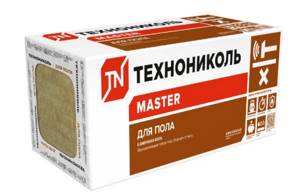
TechnoNIKOL stone wool for flooring 8 slabs 1200x600x30 mm. Photo by Leroy Merlin
Information about production features is not always available, so you have to rely on widely available information , the appearance of the insulation and reviews. But there is an alternative solution; it is necessary to compare basalt wool from different manufacturers. Customers are provided with a wide selection of products , but there are not many large enterprises with a good reputation that produce high-quality insulation materials. Some brands and manufacturers that are of increased interest to Internet users are presented below.
Isover
The Isover trademark belongs to the international industrial group of companies Saint-Gobain , whose headquarters are located in Paris. The Group of Companies has representative offices in many countries. Saint-Gobain specializes in the development, production and sale of high-quality materials and effective solutions for creating comfortable living spaces. Successfully operates in three sectors:
- innovative materials;
- construction products manufactured under several brands, in particular insulation materials are produced under the brands Isover, Isoroc, Isotec;
- distribution of building materials.
The company produces mineral wool insulation based on quartz and basalt . Stone wool is produced in factories in Germany, Spain, France, the Czech Republic, Poland, and Romania. In 2011, the company acquired a plant for the production of basalt insulation in Chelyabinsk. And just two years later, Isover stone wool appeared on the Russian market, meeting all modern requirements and quality standards . This was preceded by hard work aimed at modernizing production facilities, attracting qualified foreign and Russian colleagues, interacting with research laboratories and carrying out work based on customer feedback.
Isover stone wool is a reliable material that provides a high level of thermal protection for at least 50 years. The special fiber structure provides floor and wall insulation with excellent acoustic characteristics, which significantly reduces the noise level in the room. Insulation materials meet all basic requirements, they are durable and safe for humans and the environment. These properties have been confirmed by Russian research institutes. Thermal insulation materials are produced in accordance with the European standard EN 13162 and the international standard ISO 9011 .
Under the Isover brand, a wide range of heat and sound insulation materials are sold for all types of buildings and structures. Basalt materials cover all structures requiring insulation and insulation. It is possible to opt for a universal option or purchase products designed specifically for each individual design. The range includes solutions for private and professional construction .
Products for apartments and houses are intended for insulation of the entire house, frame walls, roofs, partitions, ceilings, floors, balconies, facades, siding. The slabs vary in thickness (from 25 to 1150 mm) and heat retention class. Professionals are provided with materials for insulating roofs, frame walls, partitions and ceilings, facades and floors. It is possible to include stone wool for sound insulation labeled “Acoustic” into a separate category.
The manufacturer's Russian-language website makes it easy to choose the best option for basalt wool by correctly selecting the required purpose, scope of application, shape, type of material, load on the insulation, heat retention class and thickness of the products.

IZOVOL
The production of IZOVOL brand products was carried out by the Belgorod Stone Wool Plant . In 2021, TECHNONICOL acquired 100% of the shares of the joint stock company ZNOiM, part of the IZOVOL group of companies. A year later, the integration of the Belgorod plant into the structure of the TECHNONICOL corporation was completed. Modernization and automation of production and logical processes made it possible to increase labor productivity by 17%. In 2019, the product range included materials for shipbuilding and new types of professional insulation for construction needs. Products are supplied to various regions of the country and abroad .
The production of high-quality basalt wool is carried out using a unique melting device , which completely eliminates the formation of slag and ensures maximum melt quality. As a result, the brand’s products are distinguished by high physical, mechanical and consumer characteristics, optimal thermal conductivity, durability, reliability and safety for humans and the environment.
The manufacturer also notes the resistance of the insulation to the effects of bending and rodents. The company's product range includes several lines of stone wool:
- IZOVOL ST , products vary in density, indicators range from 50 to 90 kg/cub.m., used for floors, partitions and sloping roofs.
- IZOVOL B , designed for insulation of ventilated facades, has a protective layer that prevents stone wool from being blown out.
- IZOVOL F , designed for thermal insulation of plaster facades, has high density and strength, water absorption does not exceed 1%.
- IZOVOL K , used for insulating flat roofs, is produced in sheets with an almost square shape, which allows you to quickly insulate large areas.
- IZOVOL KV , used for insulation of single- and two-layer roofing systems, is characterized by increased rigidity and moisture resistance.
- IZOVOL L and IZOBEL L , more universal products, are used for partitions, floors, attic spaces, attic floors.
- IZOVOL LIGHT IZOBEL LIGHT is used as a non-load-bearing heat and sound insulation layer in pitched roofs, ceilings and partitions, floors, attics and attics.
KNAUF
The top lines in the ratings of the best manufacturers of mineral wool insulation are occupied by KNAUF products. The company was founded by the Knauf brothers in 1932 . Initially, the company specialized in the production of plaster mixtures from gypsum, and later construction gypsum mixtures. In 1958, plasterboard production opened. Since the 1970s, ready-made structural parts and construction chemicals have appeared in the assortment. The subsequent stages of development included the production of high-quality insulation from glass and basalt fiber, foamed polystyrene. The company came to Russia in 1993.
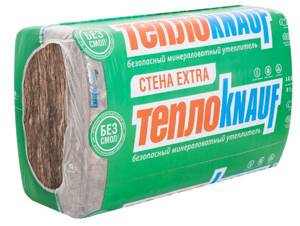
Insulation TeploKnauf Wall 50 mm, 6 sq.m. Photo by Leroy Merlin
Now the transnational company includes more than 200 factories located in Asia, Europe, North and South America. For potential clients, it is important to note that the Russian market mainly presents fiberglass-based products. Stone wool is quite difficult to find; you need to contact either the manufacturer directly or the official partners of the German company.
KNAUF insulation products are highly resistant to evaporation, have a low thermal conductivity coefficient, effectively absorb sound, and are produced without the use of dyes or bleaches. Available in slabs and rolls . There are two categories of products:
- Knauf heat is a series of basalt and fiberglass materials used in private construction to insulate various building elements: walls, ceilings, roofs. There is an option TeploKNAUF Bath based on fiberglass.
- Knauf Insulation - materials intended for professional insulation are divided into several types for use on various structures.

Paroc
Paroc was founded in 1930 in Sweden . In 1950, the production of stone wool was opened in Finland, and in Sweden the production of technical insulation and cylinders was launched. Since 1970, packaging has acquired the familiar white color with red stripes . In 1980, sandwich panels appeared in the product range, and products began to be produced under the Paroc brand. 1990-2000s the company actively expands to European and Baltic countries . Today, the enterprise has production facilities in Finland, Sweden, Poland, and Lithuania. The head office is located in the Finnish city of Vanta.
The company produces and sells energy-efficient thermal insulation solutions made from stone wool. The highest quality of basalt fiber provides a unique combination of advantages of finished products : mechanical strength, fire safety, moisture resistance, processability, sound insulation, chemical resistance, environmental properties, elasticity, dynamic elasticity. Customers are provided with insulation in the form of plates, rolls, cylinders, bends, lamellas and lamella mats .
The entire list of materials can be divided into products for construction and technical insulation. The first category includes several groups of products: general building thermal insulation and thermal insulation for walls, plaster facades, sandwich panels, flat roofs, foundations and floors on the ground, insulation and fire protection of ceilings and floors, fire-resistant building insulation, soundproof building insulation. The second group includes technical bends and segments, cylinders, lamella, piercing and OBK mats, mats for OBK and industry, plates, HVAC and OEM plates. Each line has individual characteristics and is designed to implement specific tasks.
ROCKWOOL: Sauna Butts 1000x600x100 mm. and other offers
ROCKWOOL Group (ROCKWOOL) is an international group of companies, the structure of which includes several divisions : ROCKWOOL; Rockfon; Grodan; Lapinus; Rockpanel; Rockdelta; BuildDesk. The division of the same name is a manufacturer of a wide range of solutions based on basalt wool. The company was founded in 1909 in Denmark , the central office is located in the city of Hedehusen. The production of thermal insulation was launched in 1937.
The next four decades saw the expansion of production in Europe and North America . The 1990s were marked by active expansion in the East, the company acquired and modernized factories in Eastern and Central Europe, and increased its zones of influence in Asia. In 1999, the first Russian plant , located in Balashikha, began production. Between 2006 and 2012, three more factories opened . Thus, today the number of production sites located on different continents exceeds 40.
ROCKWOOL is a manufacturer and supplier of comprehensive solutions for heat and sound insulation, fire protection of all types of buildings and structures, in shipbuilding and for industrial equipment. It's that simple. In more detail, clients are provided with materials for:
- fire protection;
- marine and industrial insulation;
- private housing construction, with the help of which it is possible to heat and sound insulate baths and saunas, fireplaces, attics and attics, ceilings, walls, in particular frame walls, the insulation of which can be carried out from the street or indoors, floors;
Reference. Of particular interest is cotton wool Sauna Butts 1000x600x100 mm, designed for insulation of baths and saunas, specially designed for walls and ceilings of steam rooms. Provides heat and vapor barrier (aluminum foil is located on one side of the sheets). They retain heat, which allows you to save on wood and electricity.
- soundproofing;
- roofs;
- facades.
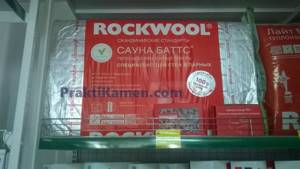
The company offers basalt insulation with middle density indicators; the most chaotic arrangement of fibers ensures high strength. The service life is at least 50 years, during which the wool does not lose its characteristics. The manufacturer notes the following advantages of the product:
- Non-flammability. Insulation materials do not burn, prevent the spread of fire, withstand temperatures up to 1000 degrees, and do not emit heat or smoke in the event of a fire.
- Thermal insulation. Insulation materials allow you to achieve optimal temperature in a room, increase its energy efficiency, and reduce utility costs.
- Soundproofing. Many insulation options absorb, some are more effective, since they are designed specifically for sound insulation.
- Water resistance. Prevents water penetration.
- Environmentally friendly. The materials are easily dismantled and recycled. Basalt wool can be converted into a similar material again and again.
URSA
Despite the interest of Internet users in URSA stone wool, the company does not offer these products, but sells the following categories of thermal insulation materials:
- URSA GEO - fiberglass-based insulation, produced taking into account high environmental requirements;
- URSA TERRA - non-flammable mineral insulation, intended for private housing construction, meets professional standards;
- URSA PUREONE - new generation non-flammable mineral insulation;
- URSA XPS - high quality extruded polystyrene foam materials;
- URSA SECO - modern high-quality membranes and films for vapor and waterproofing, wind protection of walls, ceilings and roofs.
Beltep
The production of thermal insulation of the Beltep brand is carried out by OJSC Gomelstroymaterialy (Republic of Belarus) . The company is one of the largest manufacturers of a wide range of building materials. The main goal of the enterprise is to produce only high-quality products . Beltep stone wool guarantees environmental friendliness, fire safety, energy efficiency, acoustic comfort, manufacturability, and the best price-quality ratio.
The main advantages of stone wool are vapor permeability, non-hygroscopicity, resistance to deformation, low shrinkage, different densities, and affordable price. Using Beltep stone wool, it is possible to effectively insulate various elements of buildings and structures:
- walls, ceilings, floors and partitions;
- frame buildings;
- ventilated and plaster facades;
- flat and pitched roofs.
The range also includes universal materials designed for insulating various structural elements. The products are produced in slabs, the density of which varies from 35 to 190 kg/cub.m., and thickness from 30 to 200 mm.
Euroizol
Basalt insulation of the Euroizol brand is produced in Ulyanovsk . The production of products is carried out by a company of the same name, created on the basis of the Ulyanovsk plant of thermal insulation products, known on the market since 1957. A new milestone in the history of the enterprise began in 2004. Then, together with specialists from the TERMO plant (Slovenia), the automated Heraclith line was launched . Equipping its facilities with innovative equipment allowed the company to become a major manufacturer and supplier of thermal insulation materials with a wide range of applications.
Euroizol products are distinguished by consistently high quality, low water absorption, non-flammability, resistance to deformation, good sound insulation, chemical and biological resistance. The use of unique AeroDraive technologies makes it possible to improve the basic properties of materials.
Euroizol stone wool is used for insulation in private housing construction and in the construction of civil and industrial facilities . It is used for insulation of pitched and flat roofs, floors along joists and under screed, ventilated and plaster facades, partitions, as a filler for sandwich panels, for sound insulation. Available in slabs of various thicknesses (30-200 mm) and densities (25-200 kg/cub.m.).
IZBA
The production of mineral thermal insulation is carried out by the Bogdanovichi Mineral Wool Plates Plant (BZMP). The enterprise is equipped with modern high-tech Italian equipment . The manufacturer notes the following advantages of IZBA slabs: non-flammability, non-hygroscopicity, resistance to mechanical stress, high heat and sound insulation, long service life.
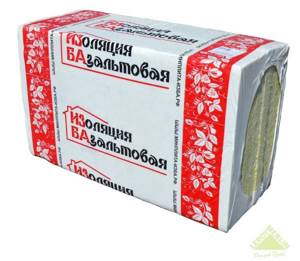
Insulation Izba Light Super 50 mm., 4.8 sq.m. Photo by Leroy Merlin
Products are manufactured on the basis of gabbro-basalt rocks with the addition of a synthetic binder. This composition provides several more important characteristics : low water absorption, biostability, and environmental friendliness.
IZBA slabs are intended for use as a heat and/or sound insulating layer in three-layer and frame walls, partitions, interfloor, basement and attic floors, plaster and ventilated facades, soft flat, pitched and flat roofs with a polymer membrane. The company offers several product lines:
- IZBA Super Light;
- IZBA Light;
- IZBA Standard;
- HUT Venti;
- IZBA Facade;
- IZBA Roof;
- IZBA Roof Top;
- IZBA Roof Bottom;
- IZBA Sandwich;
- Minslab, GOST-9573-2012, four varieties : soft slabs marked “PM”, semi-rigid - “PP”, hard - “PZh” and increased rigidity - “PPZh”.
ISOROC
ISOROC (ISOROC) is a trademark under which mineral wool thermal insulation is produced, owned by CJSC ISOROC, created in 2000, a Russian company with 100 percent foreign capital . In 2021, the company became part of the Saint-Gobain concern. Integration into the structure of a global industry leader opened up new markets for the company and the opportunity to expand its product line. Today the company produces materials of European quality that are in demand in the domestic market.
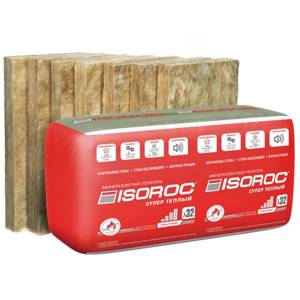
ISOROC stone wool Super Warm. Teplostroy Photos
The products have low thermal conductivity, high fire resistance, deformation and tear strength, hydrophobicity, sound insulation ability, good vapor permeability, and environmental friendliness. The consumer has several options for building insulation to choose from:
- heat-resistant boards marked “Thermal Protection” for insulating stoves, fireplaces and surfaces near this equipment;
- “Super” slabs - a line of products in slabs and rolls;
- rulers marked “P” and “PP” are intended for three-layer wall structures, frame structures, partitions and pitched roofs;
- “Izolight” and “Ultralight” - lines of materials for a wide range of tasks;
- "Isophas" - a line of products for walls under plaster;
- "Izoruf" - a series of insulating materials in slabs for interfloor ceilings and roofing of buildings;
- "Isovent" - slabs for three-layer and frame walls, ventilated facades, interfloor ceilings, pitched roofs.
Nazarovo
Nazarovo Plant of Thermal Insulation Products and Structures (Nazarovo Plant TIiK) specializes in the production of one of the most effective materials for heat and sound insulation - products based on stone wool. The production process is highly technological, as it is carried out in accordance with the project (Sweden) . This ensures high quality and compliance with stringent international requirements , which are significantly higher than Russian state standards. As a result, the finished products surpass in their characteristics not only domestic analogues, but also materials from global enterprises.
The products of the Nazarovsky plant are divided into four categories:
1) Thermal insulation boards. Used to insulate a wide range of building structures. They are made from basalt energy wool with the addition of synthetic binders with water-repellent additives.
2) Two types of mats: thermal insulation and basalt pierced energy mats with one-, two- or all-sided lining. Refers to the type of non-combustible materials. Used for insulating power equipment.
3) Two types of cords: thermal insulation and basalt energy . Designed for insulation of equipment and pipelines with surface temperatures from -120 to +700 degrees.
4) Heat-insulating energy cylinders . They are used for insulating pipelines with surface temperatures from -120 to +400 degrees. They have a longitudinal through cut, which makes installation and dismantling easier, and they can be reused.
Thermolife
The production of basalt wool under the Thermolife brand was carried out by a company of the same name from Ukraine. Based on publicly available information, it can be concluded that the company is no longer operating. However, it is possible to find Thermolife materials on sale.
Thermolife stone wool has thermal insulation, fire protection and hydrophobic properties, chemical resistance, environmental friendliness, and provides high quality installation and sound insulation.
Used for thermal insulation of internal structures: Light, EcoLight and Cavity; for facade thermal insulation: Facade, VentFasad, VentFasad V and VentFasad N; for roofing thermal insulation: Roofing; Roof B; Roof S and Roof H; for thermal insulation of floors: Pol and Pol-S; for sandwich panels: Sandwich C and Sandwich K; for technical thermal insulation: Techizol 50, 75, Techizol 100, 125 and Techizol 150.

TECHNONICOL: Rocklight and others
TECHNONICOL Corporation was founded in 1992 and is a leading manufacturer of effective and reliable solutions for construction. The structure of the enterprise includes a significant number of production sites equipped with modern equipment from leading European enterprises from Denmark, Germany, Italy, Slovenia, etc. A wide range of products . The corporation's research centers are conducting activities to develop new products . The corporation's representative offices ensure effective cooperation with clients from different countries. The corporation offers consumers a wide range of insulation materials, which can be divided into three classes:
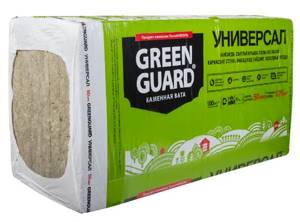
Insulation TechnoNIKOL GreenGuard Universal 50 mm 8 plates 600x1200 mm. Photo by Leroy Merlin
TECHNONICOL - non-flammable materials based on basalt rocks, intended for heat and sound insulation of various structural elements: plaster and ventilated facades, pitched and flat roofs, walls, ceilings, floors. In demand in private and industrial construction. Of particular interest is Rocklight wool , which is intended for use as an insulating layer in pitched roofs. Available in slabs.
BAZALIT - hydrophobized, non-flammable basalt materials for heat and sound insulation of facades, roofs, partitions and ceilings, attics, attics, pipelines of various types, heating networks, as well as for use in sandwich panels. Available in slabs and mats.
GreenGuard. The development of this product has become a qualitative leap in the company’s activities. The revolutionary material is produced using GEOlife technology, which is based on the use of exclusively natural raw materials and natural binders. As a result, the main advantages are: service life is 100 years, odorless, recommended for use in kindergartens and schools, medical institutions, and residential buildings.
